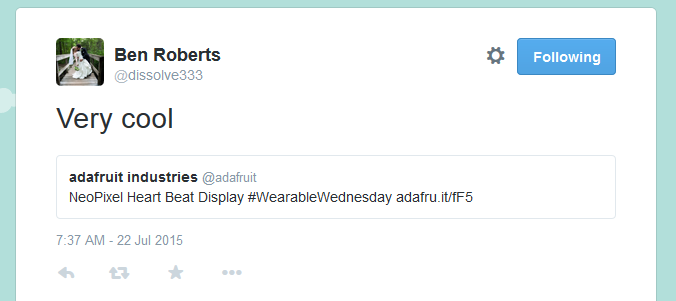quotation
“
This article is a stub. You can help the IndieWeb wiki by expanding it.
A quotation is a type of response post that is primarily a subset of the contents of another post, and often has a citation of that other post.
On Twitter, when you post a quotation of another entire tweet, they call it a quote tweet. To post a quote tweet on your own site and POSSE it, see:
- How to markup and POSSE section below
Why
Primary focus
You should post a quotation post when a quotation is the primary focus of your post, the primary content you want to convey, and everything else (URL, author, summary, tags, photo of quote) intended as optional secondary contextual information about the quote.
If any of those (URL, author, summary, tags, photo of quote) feels or seems more like the primary focus or "point" that your post is trying to make / capture / express, then read "Instead use" to see what post type you should use instead.
Portion not whole
Use a quotation when you are only quoting part of someone else's post, not the whole thing (see #repost below for quoting all of someone else's post).
The point of a quotation is to call out a specific subset, or emphasize one point or paragraph from someone else's post. Such explicit subsetting or extraction is the actual creative act of a quotation post.
E.g.: http://aaronparecki.com/notes/2014/08/27/1/
Emphasis exception
If you are quoting a post in its entirety and taking the time to emphasize specific words or phrases in the quote, e.g. with italics or bolding and a trailing "emphasis added" or "strong emphasis added" phrase explicitly noting that, then once again a quotation post makes more sense.
Secondary brief commentary
If you quote something and take the time to comment (or tag), you're likely writing a #reply, however, if your commentary is brief, or just a summary of the quote (or context thereof), and omitting it would still convey some/much of your intent, you should consider a quotation post.
E.g.: http://aaronparecki.com/notes/2014/06/01/2/indieweb
- "on posting notes from his own website" is a summary and omitting it doesn't change the intent of the quotation it's about.
Commentary on a quote can consist of a single word, or even hashtag. If that single word or hashtags serves primarily to summarize and/or distill the essence of the quote, or even just what is being implied by calling out that particular text, even if it's not (necessarily) the original author's intent, then post a quotation.
E.g.: https://aaronparecki.com/notes/2014/11/14/1/facepalm
- omitting the hashtag commentary would still convey the intent, which is to focus on that precise statement, and (especially on its own out of context) how ridiculous it reads.
See #reply below for when you should use a reply post instead when the commentary is your primary intent.
Quote entirety with commentary
If you are quoting something in its entirety and adding brief secondary commentary as noted above, and that thing has a POSSE tweet equivalent, you can consider POSSEing your quotation post to Twitter as a quote tweet.
As of 2017-01-26, Bridgy Publish supports publishing quote tweets (original feature request)
 gRegor Morrill has used Bridgy Publish for this starting 2017-01-28
gRegor Morrill has used Bridgy Publish for this starting 2017-01-28
Anyone doing this? POSSEing a quotation as a quote tweet?
Instead use
There are many posts that either use a quotation or look like quotation but are actually more than or different from a quotation where another post type would better communicate that author intention.
reply
If you have commentary (including tags) on a quotation, ask yourself:
- Is the commentary merely summarizing what's in the quotation?
- Does the quotation convey the same or similar intent without the commentary?
If no to either question then your post should be a reply instead of a quotation.
If you quote something and take the time to comment (or tag), you're likely writing a reply, especially if:
- Your commentary is more than a few words - even just one complete sentence is likely expressing enough primary intent that your post should be a reply.
- Omitting your commentary would change the implied intent of your post. If omitting your commentary would convey a different intent, i.e. supporting the quote instead of questioning/opposing it.
Then your commentary is more important, more primary, and thus you should use a reply post.
E.g.: https://aaronparecki.com/notes/2014/05/19/3/negroni
- The commentary "No, not what you think" is clearly expressing disagreement. That disagreement would not be obvious if only the quoted text was shown. Thus this is a reply more than a quotation.
Especially when your comment is your primary contribution, you are writing a reply, and the quotation is just acting as a reply-context for your commentary.
If your commentary is indeed specific to the quoted text, then you are posting a marginalia reply, and should be sure you link your in-reply-to to a fragmention of the quoted text.
Your reply should still display the quotation, but as part of its reply-context.
bookmark
A quotation which uses (a portion of) the name/title of another post (rather than (an explicitly chosen portion of) its content) should be a bookmark instead.
If a post includes an automatically (rather than explicitly) chosen portion of another post (e.g. quoting first 50 words, showing an embedded link preview), that too should be a bookmark instead of a quotation (or repost). That automatic inclusion is more like a bookmark-preview (e.g. thumbnail of page being bookmarked like a link preview) or bookmark-context (similar to reply-context) rather than an author chosen quotation.
If a quotation is there more as a reminder or summary of what you're linking to (i.e. why did you link to it), then use a bookmark instead.
E.g.: http://aaronparecki.com/bookmarks/2012/04/04/1/
- The quotation, while interesting, does not appear to express a specific point.
- However it does mention specific names which could be a reminder of why the link was bookmarked.
On the other hand if specific name(s) in the quote were person-tagged then, similar to the Emphasis exception, person-tagging a quote is a way of adding emphasis to a quote, thus making it more of a primary intent of the post, thus implying a quotation post may be appropriate for that case.
repost
A quotation of the entirety (rather than a subset) of another post should be a repost instead.
If you really mean to quote the entirety of what someone is saying in a post, then your intent is reposting, not quoting, thus you should use a repost.
There is a specific exception to this "use a repost instead" guidance, and that is when adding explicit and visible emphasis to portions of the entirety of someone else's post. In that case see the Emphasis exception noted above.
photo
A quotation used to restate or describe part of the text of a photo is likely intended more as a caption for that photo rather than the photo meant to illustrate the quote.
E.g.: http://aaronparecki.com/notes/2014/05/15/2/headline-news
When a quotation is clearly secondary to a photo in a post, even if the quotation is only part of the text of the post, and deliberately chosen, it's still secondary to the photo, and thus the post should be a photo post.
How to
How to markup
A quotation can be minimally marked up as a note, with the entry content (e-content) containing:
- a
<blockquote>that wraps the quoted text itself with explicit quote marks “”, turning any double-curly-quotes inside into single quote marks ‘’ - a
<cite class="u-quotation-of h-cite">that wraps a citation of the source of the quotation, with at a minimum:- a nested hyperlink (
<a href>) linking to the source, ideally using a fragmention directly to (at least the start of) the quotation. - link text of the name of the article/book/source
- a nested hyperlink (
How to POSSE
How can I quote reply to a tweet?
Publish a quotation of that tweet on your own site, then use Bridgy Publish to POSSE a quote tweet to Twitter.
- See https://brid.gy/about#quote-tweet for details
IndieWeb Examples
Aaron Parecki
 Aaron Parecki posts bookmarks on http://aaronparecki.com/bookmarks using p3k since 2014-09-07 (and using WordPress from 2006-12-10 to 2014-09-06), some of which include a quotation. Some of those appear to be primarily about the quotation, with the bookmark URL and title only there as secondary information about the quotation, e.g.:
Aaron Parecki posts bookmarks on http://aaronparecki.com/bookmarks using p3k since 2014-09-07 (and using WordPress from 2006-12-10 to 2014-09-06), some of which include a quotation. Some of those appear to be primarily about the quotation, with the bookmark URL and title only there as secondary information about the quotation, e.g.:
Both of those use <blockquote> to markup the quotation (as recommended above), and p-bookmark-of h-cite to markup the link to the source of the quotation. Thus the intent of those posts being quotations must be implied by the context/content, and cannot be determined automatically.
However this bookmark post appears to have a quotation that is not representative nor a specific point, but rather a reminder of why the bookmark was made, thus more of an actual bookmark post:
Some quotations are posted as plaintext notes rather than as a bookmark.
gRegor Morrill
 gRegor Morrill has posted quotations from books:
gRegor Morrill has posted quotations from books:
- http://gregorlove.com/2016/02/the-label-didnt-understand-why/
- http://gregorlove.com/2016/05/grace-means-suddenly-youre-in/
- experimenting with how to include author and title in the citation
Ryan Barrett
 Ryan Barrett has occasionally posted quotations, e.g. this quote tweet:
Ryan Barrett has occasionally posted quotations, e.g. this quote tweet:
Implementations
Bridgy
Bridgy Publish supports POSSEing quotations to Twitter as quote tweets.
[in your post’s
h-entry,] include a "u-quotation-of h-cite" with au-urlproperty that points to a tweet permalink
See Bridgy Publish: How do I post a quote tweet? documentation for more details.
Brainstorming
Brainstorming about various how-tos, design, implementation etc. about quotation / quote posts.
Falcon
See: Falcon#quote_posts
plain text design
 Tantek Çelik: plain text design for quotation posts helps with (use-cases):
Tantek Çelik: plain text design for quotation posts helps with (use-cases):
- initial implementation on sites/tools that support note posts
- design for how to POSSE to plain text destinations like Twitter
Idea 1:
- use smart quotes and an emdash:
“content of quotation, with explicit [#topichashtag] context implied by outside of the quotation, perhaps abbreviated…” — @optional_source_account CitationURL
- rough syntax: “{text}”{space(s)}—{space(s)}{optional @-name}{space(s)}{URL}…
- should be machine recognizable for automatic addition of markup like
u-quotation-from(if any "…" in content of quotation?) oru-quotation-of - @optional_source_account is useful for threading in reply to a source tweet of the article being cited/quoted
- putting it before CitationURL gives the @-name a better chance of making it into the POSSE tweet before truncation to fit, thus enabling threading with a tweet that itself has the full CitationURL
- [#topichashtag] is useful for inserting one or more hashtags of the topic(s) being referred/discussed by the quoted text, but not explicitly mentioned in the quoted text
- Twitter does auto-link "[#indieweb]" to https://twitter.com/hashtag/indieweb?src=hash
- 2019-04-28 Real world example:
- https://tantek.com/2019/118/t1/repeated-intense-prolonged-exercise-ideally and
- POSSE copy: https://twitter.com/t/status/1122551773695074310
“changes in … blood were potent but ‘transient,’ …. So activities would have to be repeated to provide any continuing [#cancer] protection, and it remains unclear how intense or prolonged that exercise ideally would need to be” — @nytimes … https://tantek.com/t50E1
Idea 2:
- use
>line-by-line prefixing just as plain text email replies have, for decades (and Markdown supports) - how do you soft-wrap a quotation?
- possible best practice for adding soft line breaks to a large nested quote that requires explicit wrapping so that the "> " show up at the beginning of each line of the quote:
- one trailing space on the end of each line to indicate a soft line-break,
- maybe soft-wrapping at last soft-wrap opportunity before 70 chars on a line, including the leading "> ",
- or if no such opportunities then breaking at the 68th character from the source
- use multiple
>characters (e.g.>>) for a quote post in a quote post etc.
- possible best practice for adding soft line breaks to a large nested quote that requires explicit wrapping so that the "> " show up at the beginning of each line of the quote:
- 2018-03-05 real world adjacent example, quoting parts of external posts in a reply:
- https://tantek.com/2018/064/t1/
- POSSE copy on GitHub (via Bridgy Publish) https://github.com/mozilla/standards-positions/pull/66#issuecomment-370610786
Silo Examples
Tumblr
- Tumblr supports an explicit quotation post kind, and presents quotation posts differently from other posts. (needs screenshots using default Tumblr skin)
- Twitter allows users to quote another tweet and embed it in a status update. This is similar to a retweet, except that it allows the user to add additional content such as a caption or commentary.
- Example: [1]
Related Projects
Quotebacks
- Introducing: Quotebacks a browser extension for quickly quoting pages on the web in your website
- Micro.blog uses Quotebacks for its Embed link. https://www.manton.org/2020/06/15/embedding-microblog-posts.html
- Matt Webb has a solid explainer and background on Quotebacks. https://interconnected.org/home/2020/06/16/quotebacks
See Also
- posts
- note
- h-cite
- repost
- bookmark
- Mastodon "quote post" design thread / explorations: https://oisaur.com/@renchap/111925452013048778
- "I said it several times, but with Ivory's latest announcement, let me repeat it: we (the Mastodon team) are working on implementing Quote Posts. This is a much more complex feature than showing a preview for a link to a post, which is done at the moment by multiple clients.It is a complex task and we have been working on defining the feature and the protocol-level details for some time. We are moving forward, and there are fewer hard questions to answers, but progress is there." @renchap February 13, 2024
- The Blockquote Element

